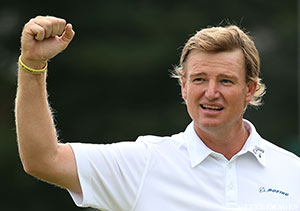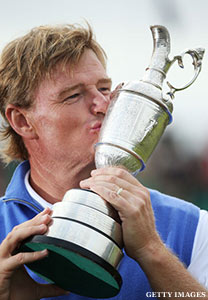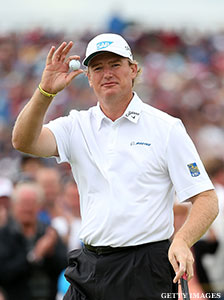These aren't exactly the best times to be a sports fan. A host of harrowing stories have dominated the headlines in the past 16 months, and it's been worth wondering if sports do more harm than good.

At Penn State, the administration protected a known child predator to preserve the image of the school and football program. In New Orleans, a team carried out an elaborate scheme rewarding players for purposely causing potential life-lasting injuries to opponents. In Los Angeles, a Giants fan was beaten into a coma in the parking lot after the first game of the baseball season. The persistence of these off-the-field incidents has been more than enough to dampen anyone's enthusiasm for what happens between the lines.
Then for two glorious hours on Sunday afternoon, we got a much-needed respite from all the ugliness. That's when Ernie Els magically turned back the clock and improbably stormed back at Royal Lytham and St. Anne's to win the 2012 British Open. And for a brief while, he reminded us how rewarding sports can be.
It had been 10 years since Els last captured a major championship, but it must've felt a lot longer to him. During that time, the hulking South African came up agonizingly short on multiple occasions, collecting nine top-5 finishes in the Masters, U.S. Open, British Open and PGA Championship without winning. He had a chance to prevail in all four majors in 2004, yet couldn't close out any of them.
Els never quite seemed the same after that year, and a knee injury in the summer of 2005 complicated his return to the pinnacle of golf. As he got older, his once-reliable putter began to fail him. In fact, the decline probably started in the '04 British Open, when he missed an uphill 12-footer on the 72nd green before losing in extra holes to the anonymous Todd Hamilton.
Fast-forward to 2011, when Els missed the cut in three consecutive majors for the first time in his career and didn't record a top-10 until October, in a Fall Series event (the Frys.com Open) he wouldn't have even entered during his prime. He finished 180th out of 186 qualified golfers in total putting, even switching to a belly putter to try to fix his issues on the greens after once calling for such clubs to be outlawed. That's how lost and desperate he was.

If Els disappeared into the sunset at that point, no one would've blamed him. Enshrined in the World Golf Hall of Fame, he had nothing left to prove. Els had already established himself as one of the greatest golfers of his era. With a young autistic son at home, golf wasn't as important as it once was.
But Els pressed on. He became more comfortable with the belly putter and slowly but surely regained his confidence. A match play victory over top-ranked Luke Donald suggested Els still had the talent to hold his own with the world's best. Near-misses at the Transitions Championship and Zurich Classic stung, especially considering how Els missed short putts down the stretch in both, but he was close. Finishing three shots back at the U.S. Open was another step in the right direction.
Finally, after shooting four straight rounds of even-par or better this week, Els rolled a 15-foot birdie putt in the center of the cup to cap off a flawless back nine. Then he watched as third-round leader Adam Scott closed with four straight bogeys to stunningly blow his chance at a first major championship. Els hoisted the Claret Jug once again, claiming a fourth major title that even he doubted he would ever get.
In all likelihood, Scott's collapse will be discussed first when people look back at this tournament years from now. But Els earned it; his final round 68 was five strokes better than anyone else shot in the last four groups. The combination of treacherous bunkers, gusting wind and tucked pin positions – not to mention the pressure of a major championship -- wreaked havoc on everyone's game.

These weren't no-names in their first moment in the spotlight who were struggling to break par. They were three major champions (Tiger Woods, Graeme McDowell and Zach Johnson), the youngest winner of the Players Championship (Scott) and a golfer with three PGA Tour titles (Brandt Snedeker). Besting Tiger was especially sweet, since no one has finished runner-up to him more than Els has.
Els' tale is obviously a lesson in perseverance, but it's more than that. It shows how sports can heal just as easily as they can devastate -- golf dealt Els as much heartbreak as anyone this side of Greg Norman and Colin Montgomerie, yet he loved the game too much to walk away and ultimately rebuilt his fractured psyche. Els has used his stature and earnings to start Els for Autism, donating and raising millions of dollars to a charity he started after his son's diagnosis. And the gracious way Els handled himself in victory by reaching out to his good friend Scott and offering him encouragement was a poignant, appropriate way to end their thrilling battle.
Come Monday morning, NCAA president Mark Emmert will formally announce the sanctions for Penn State, and we can go back to hearing about DUIs and Dwight Howard's petulance and all sorts of other stories that undermine our love of sports. Until then, we should all savor in Ernie's victory as much as he is. Everyone deserves it.




